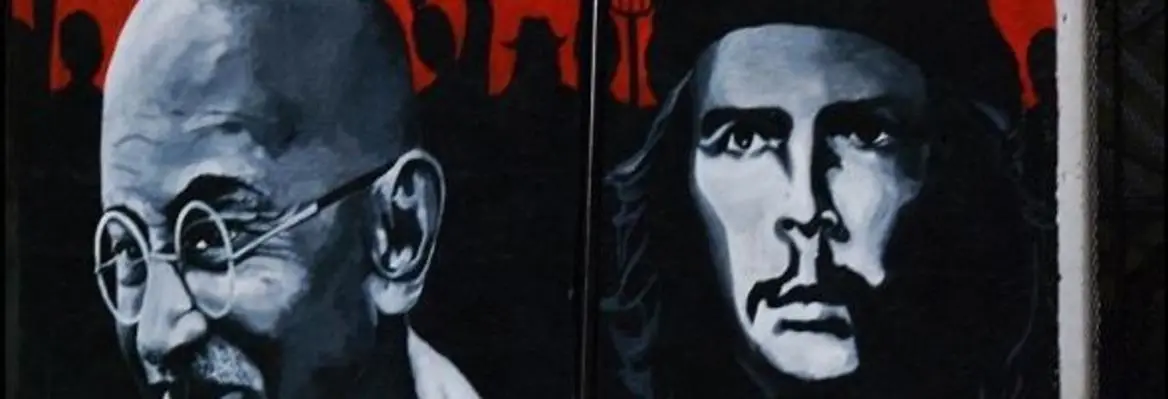Mahatma Gandhi and Che Guevara: these two historical figures are often pulled out as representing two strands of political thought about revolutionary change. In simple terms it’s often broken down into violent versus non violent struggle to achieve liberté, égalité, and fraternité. In terms of picking a winner, research shows that non-violent revolutions are twice as effective as violent revolutions, and also lead to a much greater degree of democratic freedom.
To a certain extent, there are a lot of similarities between Gandhi and Guevara. They were both middle class, male professionals. They both had utopian ideals. They both fought for a more just society. But of course their methods were completely different. Guevara believed in armed revolution. He was very influenced by what was happening in Latin America at that time: from the involvement of US multinational corporations in the overthrow of democratic governments to the brutal exploitation of agricultural workers on plantations. Gandhi had a very different view. He also saw appalling poverty and racism when he was practising in South Africa and he witnessed the poverty and injustice under British colonial rule in India. But he had a very different view about how to bring about social change. He saw non-violent direct action not as a passive tool, but the very opposite. He would say it is much more courageous, much more difficult, much more challenging, to be non-violent than it is to be violent.
“I can make a violent person non-violent but I can’t make a coward non-violent.”
Mahatma Gandhi
It was the Salt March in India, during the 1930s, that brought Gandhi to world attention. During his non-violent protest against the British salt monopoly, Gandhi walked for 240 miles over 24 days gathering ever greater numbers of followers as he went. They marched for the right to produce salt without paying a British colonial tax. Gandhi saw this as a way to mobilise millions across India in non-violent defiance of British authority. Following the march, 80,000 Indians were jailed and hundreds of people were killed, massacred by British colonial rulers. These were very violent struggles but violence came from the oppressor and the marchers didn’t meet that violence with guns. And it wasn’t just a march, they employed many tactics for overrunning the colonial rulers, including crowding out the prisons by having thousands of people arrested.
The Salt March transformed people through the experience. And the effects were far-reaching. It had a significant influence on Martin Luther King and others who fought for the civil rights of black people in the USA. The Montgomery bus boycott, in which Rosa Parks was asked to give up her seat for a white male passenger and was then arrested for non-compliance, brought Martin Luther King to her aid. In 1955 the black residents of Montgomery boycotted the bus system for over a year until the US Supreme Court overruled the city of Montgomery and segregation of black and white passengers was abolished. After that year of non-violent protest, the long history of oppression began to change and Martin Luther King became an iconic figure within the black civil rights movement.
“Non violence is a powerful and just weapon. Indeed, it is a weapon unique in history, which cuts without wounding.”
Martin Luther King















Join the conversation